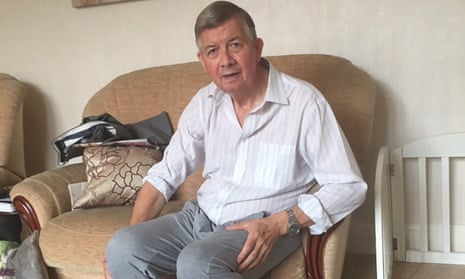Steven Brooks’s ability to walk improved significantly when he took the multiple sclerosis drug fampridine for nine months as part of a clinical trial. However, the 67-year-old former butcher’s health has declined since the trial ended and he could not get the drug on the NHS from his local hospital in Essex, because it has not been approved for use in England.
“I was diagnosed with multiple sclerosis in my mid-30s when I had numbness in my right hand. My doctor put it down to repetitive strain injury from me using a chopper in butchering but it turned out to be MS.
“I remember the nurse sat down on my bed and asked what I was going to do now. I said: ‘I’m going to carry on exactly the same.’ At the time I didn’t realise what would happen, that although MS can be very slow to progress, over time it does make it difficult to live a normal life.
“Over the years my MS gradually got worse and worse and worse. I worked for more than 20 years after my diagnosis. But by the time I retired I had numbness in my feet and couldn’t walk, was very tired a lot of the time and very limited in what I could do.
“I used to go to the pub but that became out of the question. And I’d always loved gardening – that was my main hobby – but I found it harder and harder to do that and it’s now not possible.
“I’ve always had very good care at Queen’s hospital in Romford, and my consultant neurologist there got me on to a trial in which I was given a month’s supply of fampridine at a time. It made a big difference to my ability to walk and to sit up and down. There’s nothing worse than not being able to do something simple like walk to the toilet. But it made walking so much easier.
“On the drug I was able to get up and walk, not miles but a bit further than usual, compared with before, when I could only walk a little way and was at risk of falling over. It improved my quality of life.
“I was upset when I couldn’t get the drug any more. But that’s because it’s not available on the NHS in England, because it costs so much, even though people with MS in Scotland and Wales can get it. So why can’t they prescribe it to anyone here who needs it too? I miss not having it, especially now it’s getting to the stage where I can’t walk and can’t stand up.”
As told to Denis Campbell
